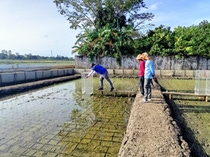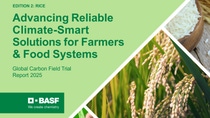Media
Cutting CO2e emissions by 30 percent without compromising yield: BASF shares new findings on rice from Global Carbon Field Trials
- Trials conducted together with the International Rice Research Institute testing technologies and interventions for climate-smart rice
- Alternate wetting and drying, direct seeded rice and improved straw management as promising interventions
Rice feeds more than 3.5 billion people every day and plays a fundamental role in global food security. At the same time, as agriculture races to reduce greenhouse gas (GHG) emissions, rice farmers face a unique challenge: how to make production more sustainable — given that traditional rice cultivation contributes around ten percent of agricultural GHG emissions and consumes vast amounts of freshwater — without risking the yields.
To address these challenges, BASF initiated a focused effort on rice within its Global Carbon Field Trial Program in 2024 in the Philippines, together with the International Rice Research Institute (IRRI). The goal: to evaluate technologies and interventions for climate-smart rice. The findings – published in a recent report – are promising:
- The trial results show that a 30 percent reduction in greenhouse gas intensity (GHGi) in rice is possible without compromising yield.
- The water management practice of alternate wetting and drying1 using direct seeded rice and improved straw management contribute significantly to reducing emissions and freshwater use in rice cultivation.
- During the rice trials, BASF’s AgBalance® Life Cycle Assement model has proven itself as an accurate way to estimate on-farm emissions – addressing a key challenge for farmers, who typically lack the means to realiably track the emissions from food production. This enables farmers to access new business models like carbon markets, possibly translating into additional value for their operations.
“After we shared the first results from our Global Carbon Field Trials in five key crops last year, these new findings in rice remind us that climate-smart solutions must be implemented and scaled in where they matter most – on the farm. Only by testing in real-world conditions we can deliver meaningful, reliable results,” says Marko Grozdanovic, Senior Vice President Global Strategic Marketing at BASF Agricultural Solutions.
The trials also highlight the importance of climate resilience, as Yvonne Pinto, Director General at IRRI, adds: “The global field trials with BASF clearly show the potential of climate-smart rice production to reduce emissions while also supporting farmers in adapting to extreme weather and challenging field conditions. This aligns perfectly with the science-driven partnerships we value at IRRI. We look forward to continuing this collaborative momentum and exploring new opportunities together.”
Global Carbon Field Trials part of broader commitment to reduce emissions in agriculture
The Global Carbon Field Trials are part of BASF’s broader commitment to reduce the CO2e emissions of five key crops by 30 percent by 2030. Multiple teams across the globe are collaborating internally across R&D units, operations, commercial, and externally with customers and supply chain partners to deliver tailored solutions toward this target.
“Despite the progress of our field trials, we recognize that research alone cannot drive change,” says Grozdanovic. “As one player in a complex value chain, we know that meaningful impact requires collaboration with farmers, research institutes, and partners across the sector. Through our Global Carbon Farming Program, we remain committed to turning insights into action at scale, working together to support farmers access carbon markets, adopt climate-smart agricultural practices, and generate verified climate impacts.”
The full report and more details are available here.
About BASF’s Agricultural Solutions division
Everything we do, we do for the love of farming. Farming is fundamental to provide enough healthy and affordable food for a rapidly growing population, while reducing environmental impacts. That’s why we are working with partners and experts to integrate sustainability criteria into all business decisions. With €919 million in 2024, we invest in a strong R&D pipeline, combining innovative thinking with practical action in the field. Our solutions are purpose-designed for different crop systems. Connecting seeds and traits, crop protection products, digital tools and sustainability approaches, to help deliver the best possible outcomes for farmers, growers and our other stakeholders along the value chain. With teams in the lab, field, office and in production, we do everything in our power to build a sustainable future for agriculture. In 2024, our division generated sales of €9.8 billion. For more information, please visit www.agriculture.basf.com or our social media channels.
About BASF
At BASF, we create chemistry for a sustainable future. Our ambition: We want to be the preferred chemical company to enable our customers’ green transformation. We combine economic success with environmental protection and social responsibility. Around 112,000 employees in the BASF Group contribute to the success of our customers in nearly all sectors and almost every country in the world. Our portfolio comprises, as core businesses, the segments Chemicals, Materials, Industrial Solutions, and Nutrition & Care; our standalone businesses are bundled in the segments Surface Technologies and Agricultural Solutions. BASF generated sales of €65.3 billion in 2024. BASF shares are traded on the stock exchange in Frankfurt (BAS) and as American Depositary Receipts (BASFY) in the United States. Further information at www.basf.com.
1 Alternate wetting and drying is a water- and climate-friendly irrigation method used in rice cultivation, in which rice fields are not permanently flooded but are alternately irrigated and drained (source: IRRI).
P-25-162


